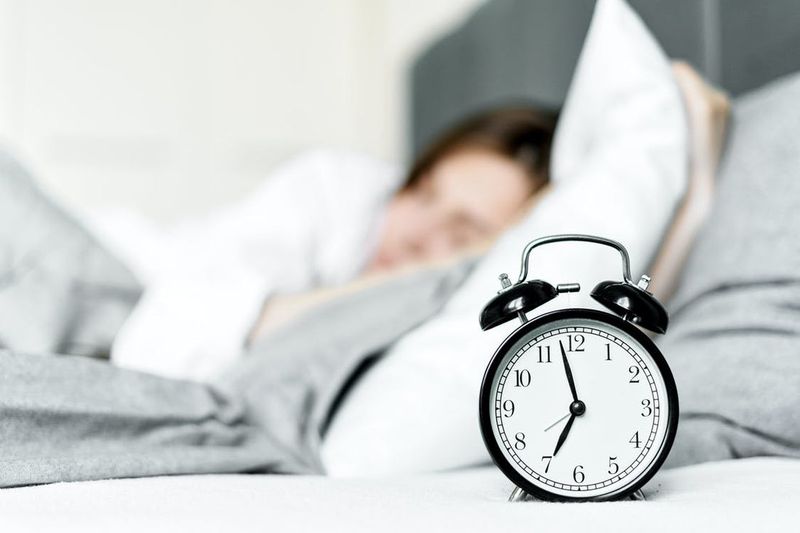Waking up Tired? Here Are 10 Potential Reasons Why (They’re All Easy To Fix)

Dragging yourself out of bed even after a full night’s sleep? You’re not alone. Many people experience grogginess in the morning and assume it’s just a part of getting older or being busy. But feeling exhausted first thing in the morning isn’t always normal—and it’s often fixable. There are plenty of sneaky culprits behind that lingering fatigue. The good news? Most of them are simple to identify and even easier to change. Whether it’s your evening habits, bedroom environment, or diet, tweaking a few things can transform how you feel when you wake up. Here are 10 possible reasons you’re waking up tired—and what you can do about each one.
1. You’re Dehydrated

Thirst isn’t the only sign of dehydration. Overnight, you lose fluids through breathing and perspiration, sapping your energy. Even mild dehydration can leave you feeling sluggish and rob you of that morning pep in your step. A simple glass of water can be an invigorating start to your day. Begin each morning with a refreshing glass to replace lost fluids.
Remember, hydration starts the night before, but timing is key. Avoid drinking too much right before sleep to prevent those annoying midnight bathroom treks. Instead, sip steadily leading up to bedtime. It’s the little habits that make the biggest difference.
For an added zest, add a slice of lemon or a splash of lime to your water. Not only does it taste great, but the citrus aroma can give you a wake-up boost. So, fill up that glass and let hydration rejuvenate your mornings.
2. You’re Using Screens Right Before Bed

Scrolling through social media or binge-watching shows right before bed might be sabotaging your sleep. The blue light emitted by screens interferes with melatonin production, the hormone that helps you sleep. This disruption makes falling asleep a challenge and keeps you tired the next day.
Why not try a digital detox? Powering down electronics at least 30 to 60 minutes before bed can reset your body’s natural rhythm. Pick up a book, or practice calming meditation to ease into slumber.
Imagine the difference a screen-free bedtime routine could make. With this small change, you’ll soon find yourself drifting into a peaceful night’s sleep, waking up refreshed and recharged.
3. You’re Not Sleeping Long Enough

Burning the midnight oil might seem productive, but cutting corners on sleep costs you dearly. Adults need 7 to 9 hours of rest, and even skimping by 30 minutes can accumulate sleep debt. This debt leaves you feeling groggy and dull, not ready to tackle the day.
Embrace the magic of a set sleep schedule. Consistency is your ally. Going to bed and waking up at the same time every day, even on weekends, can dramatically improve your rest quality.
Picture this: a smooth morning routine without the snooze button. With more sleep, you’ll be more alert, focused, and ready to seize the day. Give yourself the gift of time and let your body thank you with energy and vitality.
4. You’re Drinking Alcohol or Caffeine Too Late

An evening coffee or a nightcap might seem harmless, but they can wreak havoc on your sleep cycle. While caffeine perks you up, it lingers for hours. Alcohol, although initially sedating, disrupts the deep REM sleep essential for feeling rested.
Timing is everything. Steer clear of caffeine past 2 PM, and enjoy any alcoholic drinks early in the evening. Your body will thank you come morning.
Visualize waking up naturally, no caffeine jolt required. By adjusting your drink habits, you’ll experience more restful nights and invigorated mornings. It’s a small shift with big outcomes.
5. Your Bedroom Environment Isn’t Sleep-Friendly

Does your bedroom feel like a sanctuary? If not, it might be affecting your sleep quality. Too much light, noise, or an uncomfortable temperature can prevent you from achieving deep, restorative sleep.
Transform your space into a sleep haven. Keep the room dark with blackout curtains, maintain a cool 65°F, and consider a white noise machine if sounds disturb you. These small tweaks can significantly enhance your rest.
Imagine a peaceful retreat every night where comfort reigns supreme. With a few adjustments, your bedroom can cradle you into a deep slumber, ensuring you wake up revitalized and ready for whatever the day holds.
6. You’re Going to Bed Stressed or Anxious

Stress can tangle your thoughts and make sleep elusive. Lying in bed with racing thoughts keeps your body in a state of alert, not the peaceful drift into slumber you crave. This tension translates to restless nights and weary mornings.
Cultivate a calming bedtime routine. Journaling, a few gentle stretches, or using a sleep meditation app can work wonders in easing your mind and prepping it for rest.
Picture a serene wind-down, shedding stress like a snake sheds skin. Through these mindful practices, you can welcome tranquility and embrace restful nights, leading to energetic, fulfilling days.
7. You Have Poor Sleep Posture or Bad Pillows

Awakening with aches and pains can be traced back to poor sleep posture or unsupportive bedding. Your neck and spine need alignment to prevent discomfort, and the right pillows and mattress are crucial.
Invest in your rest with a suitable pillow and mattress. Side sleepers and back sleepers have different needs—find what works for you and make the necessary adjustments.
Envision pain-free mornings, where comfort greets you at dawn. By tailoring your sleep setup to your body, you’ll find the rest you need to wake up renewed and ready to embrace the day.
8. You’re Snacking Too Late

Midnight munchies might satisfy cravings, but they can interfere with restful sleep. Heavy or sugary late-night snacks kick your metabolism into high gear, making it harder for your body to wind down.
Set a snack curfew. Enjoy your last meal or snack at least 2 to 3 hours before bed. If hunger strikes, choose light options like a banana or yogurt.
Visualize a night where your stomach isn’t grumbling or busy digesting. With this simple tweak, your body can fully relax, leading to more restorative sleep and brighter mornings.
9. You Have an Irregular Sleep Schedule

Late nights one day and early mornings the next disrupt your internal clock. An irregular sleep schedule can leave you feeling off-kilter and struggling with tiredness.
Regularity shines here. Aim to wake up and go to bed at the same time each day, even on weekends. This consistency helps reset your internal rhythm.
Imagine a life where your body’s internal clock is in sync, and mornings greet you with clarity and energy. By embracing a regular schedule, you can enhance your overall well-being, making those groggy starts a thing of the past.
10. You’re Not Getting Enough Morning Light

Morning light is nature’s way of resetting your internal clock, but missing out on this natural boost can leave you sluggish. Exposure to sunlight in the morning helps regulate your circadian rhythm, promoting alertness during the day.
Start your day with sunlight. Spend 10 to 15 minutes outside, or open your curtains as soon as you wake up to let the light in.
Picture mornings where daylight invigorates you instead of leaving you in the dark. This small change can align your body’s natural cycles, leading to more energy and a brighter outlook.

Comments
Loading…